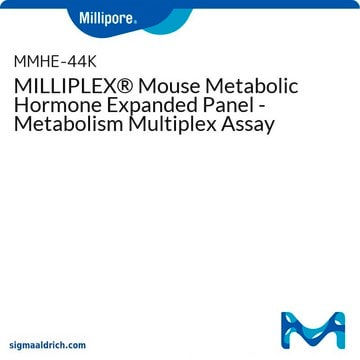MADPNMAG-70K-01
MILLIPLEX® Mouse Adiponectin Magnetic Bead- Single Plex - Endocrine Assay
This MILLIPLEX MAP Mouse Adiponectin Magnetic Bead Single Plex Kit is an Endocrine single plex assay. The analyte available for this kit is Adiponectin.
Synonym(s):
Adiponectin Assay Kit
About This Item
Recommended Products
Quality Level
species reactivity
mouse
manufacturer/tradename
Milliplex®
assay range
accuracy: 96%
sensitivity: 3.0 pg/mL
standard curve range: 12.2-50,000 pg/mL
inter-assay cv: <20%
intra-assay cv: <15%
technique(s)
multiplexing: suitable
compatibility
configured for Single Plex
detection method
fluorometric (Luminex xMAP)
shipped in
wet ice
General description
MILLIPLEX® Mouse Adiponectin Single Plex Kit is to be used for the simultaneous quantification of Adiponectin in mouse serum, plasma, tissue/cell lysate and culture supernatant samples. This kit uses a 96-well format, contains a lyophilized standard cocktail, two internal assay quality controls and can measure up to 38 samples in duplicate.
The Luminex® xMAP® platform uses a magnetic bead immunoassay format for ideal speed and sensitivity to quantitate multiple analytes simultaneously, dramatically improving productivity while conserving valuable sample volume.
Panel Type: Metabolism
Specificity
Each antibody pair in a panel is highly specific and displays insignificant cross-reactivity to other analytes in the panel.
Application
- Analyte: Adiponectin
- Recommended Sample Type: Mouse serum, plasma, cell/tissue culture supernatants and lysates
- Recommended Sample Dilution: 25 μL per well of 1:5000 diluted serum or plasma; cell/tissue culture samples may require dilution in an appropriate control medium
- Assay Run Time: Overnight (16-18 hours) at 2-8°C or 2 hours at room temperature (20-25°C).
- Research Category: Endocrine
- Research Subcategory: Obesity, Metabolic Disorders
Packaging
Legal Information
Disclaimer
Signal Word
Warning
Hazard Statements
Precautionary Statements
Hazard Classifications
Acute Tox. 4 Dermal - Acute Tox. 4 Inhalation - Acute Tox. 4 Oral - Aquatic Chronic 2 - Skin Sens. 1
Storage Class Code
10 - Combustible liquids
Certificates of Analysis (COA)
Search for Certificates of Analysis (COA) by entering the products Lot/Batch Number. Lot and Batch Numbers can be found on a product’s label following the words ‘Lot’ or ‘Batch’.
Already Own This Product?
Find documentation for the products that you have recently purchased in the Document Library.
Related Content
Multiplex immunoassays save time and sample volume in metabolic syndrome research, providing comprehensive insights into related conditions.
Multiplex immunoassays save time and sample volume in metabolic syndrome research, providing comprehensive insights into related conditions.
Multiplex immunoassays save time and sample volume in metabolic syndrome research, providing comprehensive insights into related conditions.
Multiplex immunoassays save time and sample volume in metabolic syndrome research, providing comprehensive insights into related conditions.
Our team of scientists has experience in all areas of research including Life Science, Material Science, Chemical Synthesis, Chromatography, Analytical and many others.
Contact Technical Service








